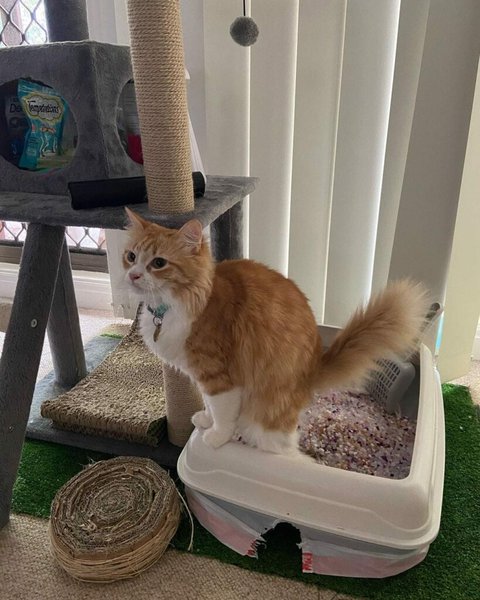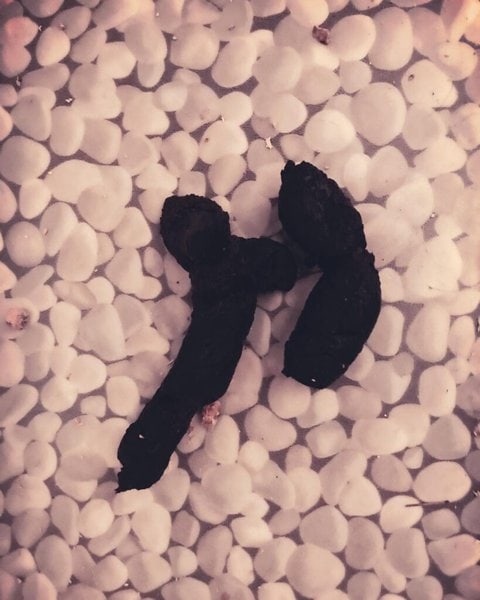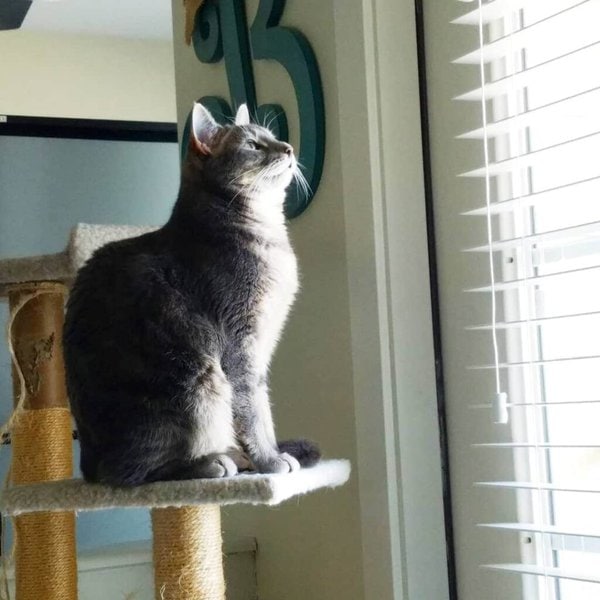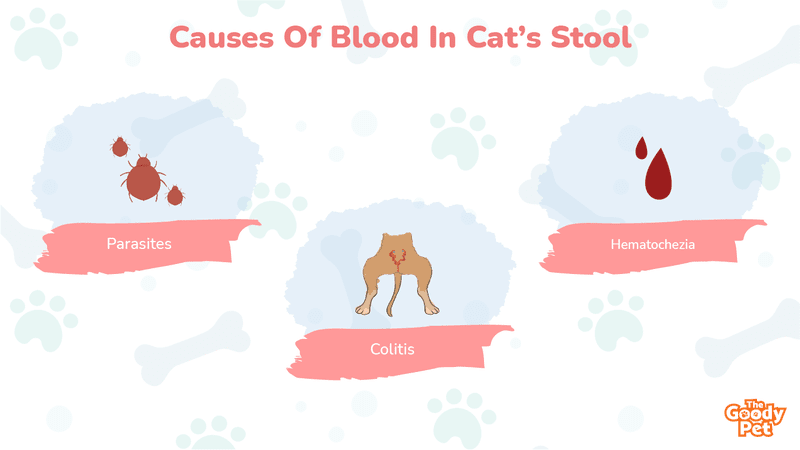As a cat parent, one of the things that can be cause for a lot of concern is seeing blood in your cat’s stool. While it’s something most of us don’t wish to ever deal with, it is always better to be prepared.
What causes blood in your cat’s stool? Bloody stool is a sign that there is an underlying problem affecting your cat. Sometimes, the problem could be something minor, and in some cases, it could be a serious problem. The only way to know is to have your feline buddy checked out by a vet.
In this article, we are going to cover everything you need to know about blood in your cat’s stool, including the causes, what you can do about it, how to prevent it, how to take care of dogs with inflammatory bowel diseases, and so on. Before that, however, let’s look at what the presence of blood in your cat’s stool actually means.
What Does Blood In My Cat’s Stool Mean?

Blood in your cat’s stool could mean that your kitty is suffering from any of the following conditions:
Colitis
Colitis is one of the most common causes of blood in your cat’s stool. What exactly is colitis in a cat? Colitis refers to a condition characterized by colon inflammation. When your cat has colitis, you will notice red or pinkish blood droplets in your kitty’s poop.
Inflamed intestines in cats can be caused by several issues, including stress (this is known as stress colitis in cats), diet changes, cancer, trauma, inflammatory bowel disease, food intolerance, and so on.
Diarrhea
Diarrhea is another common cause of blood in cat stool and very smelly poop. When your feline friend has diarrhea, this can irritate the lining of the colon, rectum or anus and cause bleeding. This blood will then be passed together with the cat’s stool.
Coccidiosis
Sometimes, bloody stool could also be caused by coccidiosis. Coccidiosis in cats is a condition resulting from infection by coccidia, a protozoan that infects the intestinal tract. Extreme cases of coccidiosis can lead to severe dehydration and blood loss, which can be fatal.
Other Conditions
Other conditions that can lead to bloody stool include constipation, trauma to the rectum, panleukopenia, or overfeeding. Parasites like worms can also cause blood in cat stool.
If you notice blood in your kitty’s stool, you should immediately get in touch with a vet and have them check out what the problem could be. Ignoring bloody stool in your cat can lead to fatal consequences.
What Causes Black Stools In Cats?

In most cases, blood in a cat’s stool appears as red or pinkish fresh droplets. This condition is known as hematochezia and shows that the blood is coming from the lower sections of the GI tract.
Sometimes, however, you’ll notice that your cat’s stool is black and tarry. This is a symptom of a condition known as melena. So, what is melena in cats?
Melena also shows that there is blood in your cat’s stool. However, this blood appears black in color because it has already been digested. The digested blood signifies that the bleeding is happening upper along the gastrointestinal tract, such as in the stomach or small intestines.
As a result, melena is usually more serious than hematochezia. Cats with black, tarry stool should be taken to a vet immediately. Melena could be a sign of serious conditions such as…
Ulcers
Black and tarry cat stool could be a symptom of stomach ulcers, which result in bleeding. As the blood moves from the stomach to the small intestines and then to the colon, it gets partially digested, resulting in the darkish color.
Oral Or Respiratory Tract Bleeding
If your cat is bleeding either in the respiratory tract or the oral cavity, this blood will get ingested, get digested as it passes through the GI tract and get passed as black stool. Such bleeding, especially in the respiratory tract, could be a sign of a serious underlying condition.
Melena can also be a sign of intestinal bleeding, trauma, stomach lining inflammation, or tumors.
How Does An Indoor Cat Get Worms?

We have already seen that blood in your cat’s stool can be caused by worms. However, if your kitty rarely goes outside, you might be wondering, how does an indoor cat get worms?
Can Indoor Cats Get Parasites?
Yes, it is possible for indoor cats to get parasites and worms.
Fleas are one of the major ways through which cats get infected with worms. If a flea finds its way into your house and onto your kitty’s coat, your cat could end up ingesting the flea, leading to a tapeworm infection.
Household members who go in and out of the house every day could also accidentally get into contact with worm eggs or fleas and carry them into the house, where they then end up infecting your feline buddy.
Your cat can also get parasites when they hunt small animals that make their way into your house, such as lizards. If you have two or more animals sharing a litter box, your cat can potentially get worms from the litter box in this manner.
Dietary Changes
Sometimes, blood in your indoor cat’s stool may not always be a sign of worms. Changing your cat’s food can also cause bloody diarrhea. However, this should pass within a few days, after your four-legged buddy has adjusted to the new food.
Signs Of A Worm Infection
How can you tell if your cat has worms? Some common symptoms include bloody or mucoid stool accompanied by vomiting, change in appetite, constipation, weight loss, and irritation around the rear end.
Do Probiotics Help Cats With Inflammatory Bowel Diseases (IBD)?
We already saw that one of the conditions that can cause stool in your cat’s blood is inflammatory bowel disease (IBD).
If your kitty is suffering from IBD, one of the available remedies is to use probiotics.
Probiotics are supplements that boost your cat’s gut health by introducing beneficial bacteria, thus helping reduce inflammation. However, some probiotics can hurt your cat, so you should do proper research before giving a probiotic supplement to your cat.
If your cat has IBD, I recommend giving your cat PetUltimates Probiotics. This probiotic supplement contains the right beneficial bacteria that help stop vomiting and diarrhea.
Apart from probiotics, other home remedies for blood in cat stool include…
Water
When your kitty has diarrhea and bloody stool, they lose fluids very fast and can easily get dehydrated. To prevent dehydration, you should ensure that there’s enough clean drinking water for your furry buddy.
CBD Oil
CBD oil has anti-inflammatory properties, and can therefore be used to ease your cat’s gastrointestinal inflammation. CBD oil can also help reduce anxiety. I recommend using HolistaPet’s CBD Oil, which is made using all-natural organic ingredients.
Bland Foods
When your cat has an inflammation of the GI tract, you should give them bland foods that are unlikely to aggravate the inflammation. A great option is to give your kitty a rice and burger mix.
If your cat doesn’t like rice, you can give mashed potatoes as an alternative. These foods help relieve diarrhea and provide your cat with nutrients without exacerbating the inflammation.
How To Take Care Of Cats With IBD?
Common knowledge tells us that prevention is better than cure, so it is better to take preventative measures to reduce the chances of your feline buddy suffering from IBD. Here are some things you can do to prevent IBD in cats.
Provide Healthy Diet
Proper diet is the cornerstone to keeping health issues like IBD at bay. To prevent IBD, you should give your cat foods that are highly digestible, have high protein and low-fat content, and contain minimal additives.
I recommend feeding your kitty with Nom Nom Cat Food if you want to keep IBD at bay. This food contains low-fat novel proteins, high moisture content for improved digestibility, and zero additives.
Exercise
Ensuring that your kitty gets adequate exercise will help keep them healthy and provide them with mental stimulation. This can help reduce stress, which we saw can lead to colitis.
You can make sure your cat gets enough exercise by getting them a fun toy to play with, such as the Cooway Interactive Laser Cat Toy. With automatic on-and-off feature and two game modes, this toy is a great way to keep your cat engaged.
Alternatively, you can buy your cat a cat tree for them to play on.
Properly Clean Your House
If your cat has worms, you will have to clean your house thoroughly to minimize the chances of reinfection. You need to deeply vacuum your floors and carpets, use an all-purpose cleaner for surfaces, and thoroughly clean your cat’s litter box and beddings using hot water.
Related Questions
Can Stress Cause Diarrhea In Cats? Yes, stress can cause diarrhea in cats. Other things that can stress your cat include moving to a new home, a trip to the vet, the introduction of a new pet at home, home remodeling, unexpected aggression from another pet in the household, or even welcoming a new baby in the family.
What Are The Symptoms Of A Cat Dying Of Kidney Failure? Some of the signs that your cat is dying of kidney failure include dehydration, loss of appetite, diarrhea, vomiting, body odor, bad breath, dull, sunken eyes, muscle twitching, bladder incontinence, confusion, blindness, tongue discoloration, and increased skin problems. End-stage kidney failure can cause lots of suffering for your cat, so the vet will sometimes recommend euthanasia.
How Long Do Cats Live With Inflammatory Bowel Disease? With appropriate treatment, cats with inflammatory bowel disease can live for many years, with great quality of life. The focus of treatment should be on preventing weight loss, minimizing your cat’s immune response to the inflammation, and reducing the gastrointestinal tract symptoms. Treatment will usually be done through medication and diet changes.





